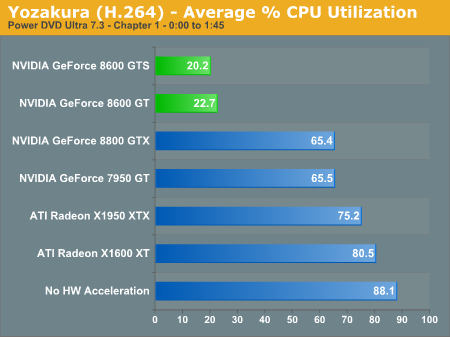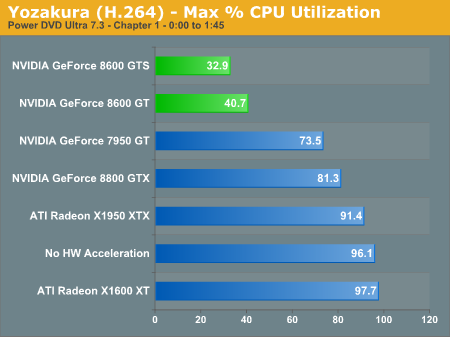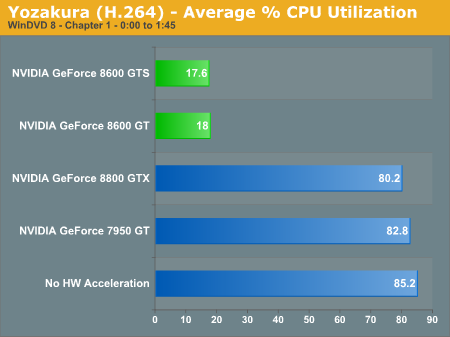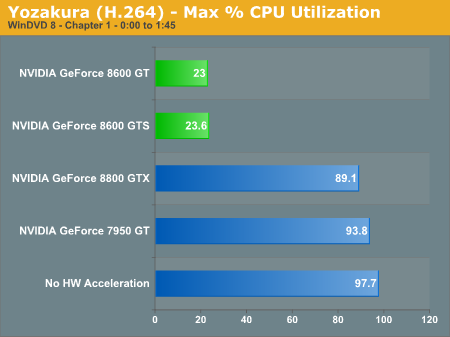NVIDIA GeForce 8600: Full H.264 Decode Acceleration
by Anand Lal Shimpi on April 27, 2007 4:34 PM EST- Posted in
- GPUs
Yozakura (H.264)
The Yozakura test isn't the highest bitrate test we have, but it is the most stressful we've encountered due to how it uses the H.264 codec. Our benchmark starts at the beginning of chapter 1 and continues until the 1:45 mark.

We start off with PowerDVD and immediately we see the tremendous difference that NVIDIA's new video decode engine offers. While even the previous generation NVIDIA hardware still eats up more than a single CPU core, the 8600s average in the low 20% for CPU utilization.

All of the steps that happen outside of the green box are responsible for any remaining CPU utilization seen when playing back H.264 content on a GeForce 8600.
Why isn't the CPU utilization down to 0%? The entire H.264 decode pipeline is handled on the GPU, but NVIDIA claims that the extra 20% is simply related to processing and decrypting data off of the disk before it's passed on to the GPU. If you had an unencrypted disk, the CPU utilization should be in the single digits.

The maximum CPU utilization for these two cards is still significant, but obviously much better than the 70%+ of the competitors. Surprisingly enough, ATI's hardware actually does worse than NVIDIA's in these tests despite offloading more of the decode pipeline than the GeForce 7 or 8800.
To confirm our findings we also ran the tests under WinDVD 8, which as we mentioned before doesn't support ATI hardware acceleration so the only GPUs compared here are from NVIDIA.

NVIDIA's older hardware actually does worse under WinDVD 8 than under PowerDVD, but the 8600 does a lot better.

Maximum CPU utilization is particularly better on the 8600s under WinDVD 8, the two never even break 24%.
Looking at the PowerDVD and WinDVD scores, it's interesting to note that while the 8600 GTS is clearly faster in PowerDVD, the two cards are basically tied under WinDVD. There is definitely room for further optimizations in PowerDVD at present, so hopefully we will get that along with bug fixes in a future update.










64 Comments
View All Comments
bearxor - Monday, May 21, 2007 - link
How come we still don't have a article or benchies on a 8500?billd - Friday, May 4, 2007 - link
It's a mystery to me why nvidia thinks we are interested in H.264 when there is so little material encoded in it. Of the shipping HD disks reviewed on the hidefdigest.com site, most Blu-Ray titles are encoded in MPEG-2 and most HD DVD titles are encoded in VC-1. Furthermore there are more Blu-Ray titles encoded in VC-1 than H.264. It would have been more helpful if nvidia had natively supported VC-1 first and introduced H.264 later. i.e.Blu-Ray:
MPEG-2 : 121
AVC MPEG-4 : 30
VC-1 : 46
HD DVD:
MPEG-2 : 2
AVC MPEG-4 : 10
VC-1 : 161
Perhaps there are some TV broadcasts in H.264 however given the low bit-rate compared to HD disks there should be little benefit offloading from the CPU to the video card.
SilverTrine - Wednesday, May 2, 2007 - link
Its not really appropriate to call ATi defunct when they have folded into another company, and hardware is still being sold under the ATi name.Parhelion69 - Monday, April 30, 2007 - link
Anand, I've seen in some previous benchmarkings that software solutions using CoreAVC gave better results than hardware decoding on previous generations of ATI and NVIDIA video cards, could you make some tests to see if this behavior still applies?Also I'd love to see tests on older CPUs, like a single core athlon 64 3000+, to see the real help of the decoding on hardware.
Thanks a lot, I always find your reviews extremelly helpful and professional, keep the good work up!
Delerue - Friday, May 4, 2007 - link
Yeah. I agree. Indeed, some people already sugest this to the Xbit Labs review, since they missed the same things. Look here: http://www.xbitlabs.com/discussion/3743.html">http://www.xbitlabs.com/discussion/3743.htmlBTW, nice review, Anand. You're the guy that I really trust when we talk about hardware. In time, have you confirmed this 'I believe that only PowerDVD/WinDVD support the 8600's hardware acceleration at this point'? Ah! You talked about Intervideo forum, but I can't find it. Can you give to me the adress, please?
Thanks and keep going!
Tewt - Monday, April 30, 2007 - link
What am I missing here? Wasn't this tech introduced in the 7xxx series? Was I getting 'part' as opposed to 'full'? Or is this 'acceleration' versus 'decoding' and what is the difference?And I would like to throw in my two cents along with Parhelion. Just from general reading, my opinion is I keep seeing more and more raw power being thrown around with HD decoding/viewing/etc. Where is the lowest bar for watching HD with no 'hiccups'?
I would love to see someone write a code for Linux for watching HD and we find out a 1Ghz PIII and an ATI 8500 or Nvidia 5500 would run it just fine.
Sorry, thought I was watching HD content(games and downloaded trailers) just fine not too long ago with my A64 3200+ and Geforce 6600GT.
DerekWilson - Tuesday, May 1, 2007 - link
games and downloaded trailers are much much lower bitrate than especially blu-ray is capable of. lower powered cpus and older gpus can handle these fine, its the heavy hitting stuff that is the problem.the 7 series did not offer full decode. nothing has offered full decode until now. so yes, you were getting part. much of the decode process was being performed on the cpu, while the partially decoded video was sent to the gpu for final processing.
with the 8600/8500, the cpu handles aacs and i/o overhead, decrypting the data on the disk, and re-encrypting the data stream to send to the gpu. this is for aacs protected content of course. games and downloaded content won't have all this stuff going on. your hd videos will still play with less cpu intervention especially in the case of h.264 videos.
bigpow - Monday, April 30, 2007 - link
don't these people ever learn?they f#$ked up the 6800GT/Ultra vs 6600GT with purevideo and now did it again?
erikejw - Sunday, April 29, 2007 - link
I cannot find a single word on picture quality in the article hence I assume it is top notch and there is no difference at all.I have no hardware decoder on my system and the quality of the different software decoders
are from ok to abysmal.
In a cheap HTPC system a slow Athlon x2 seems to be a good fit.
I'll build my system around one and a 8500 card.
DerekWilson - Tuesday, May 1, 2007 - link
decode quality is equal to powerdvd software decode quality at least.nvidia will be including hd filtering/post processing for the 8600 series on par with 8800, while the 8500 may not have the processing power to fully implement all the quality features.
we will be evaluating performance using the hd version of silicon optix hqv when finalized. and we may take a look at our beta version before that as well.